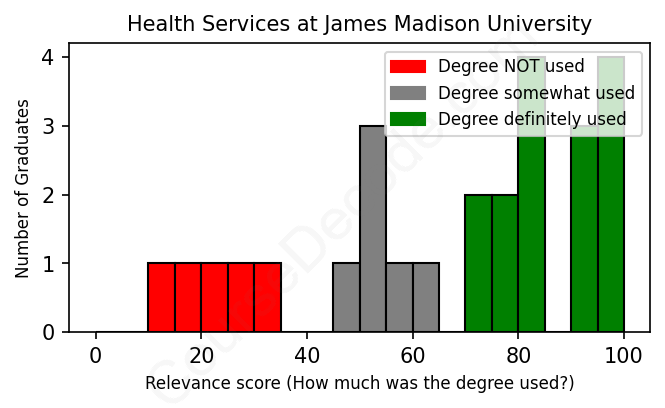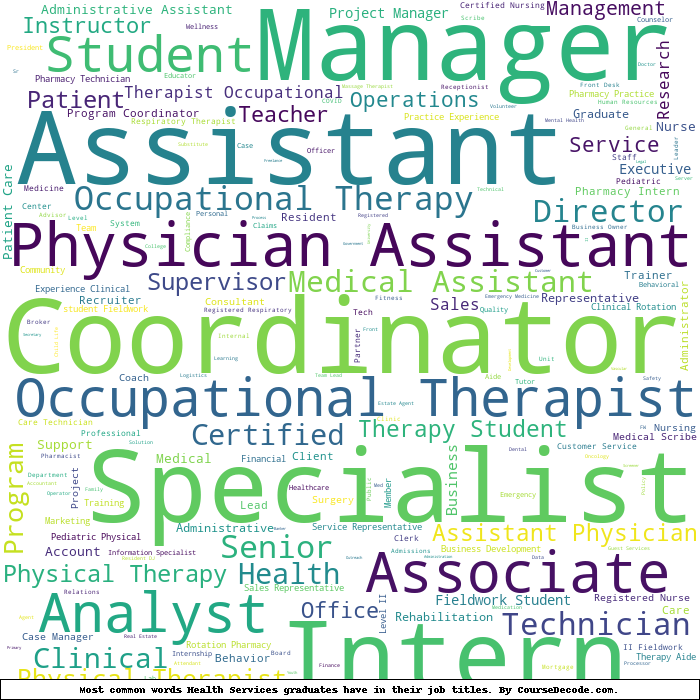
First, some facts. Of the Health Services graduates from James Madison University we've analyzed , here's how many have used (or NOT used) their degree in their career:

These are estimates based on AI analysis of 26 LinkedIn profiles (see below).
The verdict? Slightly below average. Overall, with an average relevance score of 66%, Health Services graduates from James Madison University have a slightly lower likelihood (-1%) of finding work in this field compared to the average graduate across all fields:
And for comparison, here's the chart for all profiles we've looked at across all degrees.
Also, after graduating, 50% of these graduates have pursued further education other than another Bachelor's degree (such as a Masters degree or other), compared to the average across all profiles of 35%. This suggests you may need more than just a Bachelors degree to be competitive as a Health Services graduate.
See the details:
|
Relevance score: 91% We think this person has gone into a career highly relevant to their degree. We think this person has gone into a career highly relevant to their degree.
DEGREE INFOGraduated in 2014 from James Madison University with a Bachelor of Science (BS) in Health Services. Also pursued further education since (see below). JOB HISTORY SINCE GRADUATIONResearch Associate Brown University Jan 2015 - May 2016 Clinical Research, Joint Replacement Division  Stryker May 2016 - Feb 2020 Medical Affairs, Oncology  Bristol Myers Squibb Jan 2021 - Feb 2022 R&D Global Baby Scientific Engagement  Kenvue May 2023 - Present FURTHER DEGREES DONE SINCE GRADUATINGMaster of Science (M.Sc.)Brown University 2014 - 2016 ABOUTNo information provided. |
The top 10 most common jobs done by the graduates we've analyzed (ranked most common to least) are:
After going through the LinkedIn profiles of graduates from James Madison University who studied Health Services, it’s clear that there’s a mix of job types they have pursued. A lot of them have landed roles such as Medical Assistants, Occupational Therapists, and various research-related positions. These jobs definitely tap into the health services education they received, allowing them to apply their knowledge directly in clinical or patient care settings. For instance, being a Medical Assistant or an Occupational Therapist involves hands-on patient interaction and a solid understanding of health practices, which aligns perfectly with what they learned in school.
However, not all roles were as closely tied to health services. Many graduates ended up in positions like sales, administrative roles, or even in completely unrelated fields like real estate or hospitality. While some of these jobs might benefit from general health knowledge or soft skills developed during their degree, they don’t really utilize the specialized education that a Health Services degree provides. So, if you're considering a Health Services degree, be prepared for various career paths—some that are a perfect fit and others that might leave you wondering how you ended up in that role in the first place!
Here is a visual representation of the most common words in job titles for Health Services graduates (this is across all Health Services graduates we've analyzed, not just those who went to James Madison University):

Graduates from James Madison University with a degree in Health Services seem to embark on a variety of career paths, especially early in their professional lives. Many of them land their first jobs in roles directly related to health services, such as medical assistants, pharmacy technicians, and research coordinates, which is a promising start. For instance, graduates who briefly worked as medical assistants or in research positions appear to transition well into more advanced roles in healthcare settings or research positions within reputable institutions. A good number of alumni, about five to ten years post-graduation, find themselves in more senior positions, like directors of rehabilitation or public health research coordinators, which indicates steady career progression relevant to their degree.
However, it's not all smooth sailing for every graduate. Some alumni pivot quite drastically into fields not directly linked to health services; for example, there are graduates who transition into real estate or sales roles. It’s kind of a mixed bag, where while a decent number of graduates are indeed carving out successful careers in healthcare and related fields, a significant portion also seems to drift into unrelated jobs after graduation. Ultimately, it looks like graduates from this program have a solid start in health services, but the long-term outcomes can vary widely, with some branching out into other industries entirely.
Honestly, a Bachelor’s degree in Health Services can be on the challenging side, but it’s definitely manageable if you stay organized and put in the effort. At James Madison University, like many schools, you'll dive into a mix of health administration, policy, and maybe even some social sciences, which can get pretty intricate. You’ll also likely have group projects and presentations, and that can pile up sometimes. But if you’re passionate about the subject and keep up with your readings and assignments, you might find it enjoyable and rewarding rather than overwhelming. Overall, it’s not like you’ll be drowning in super tough exams every week, but it does require consistent work and engagement.
Most commonly, in the LinkedIn profiles we've looked at, it takes people 4 years to finish a Bachelor degree in Health Services.
Looking at the job paths of these Health Services graduates from James Madison University, it seems like they have landed in a mix of decent-paying roles and more modest ones. Graduates who've gone into fields like medical research, pharmacy, and occupational therapy generally have the potential to make good money, especially with experience. For instance, roles like a Radiologic Technologist or Research Program Coordinator at prestigious institutions can earn a solid salary. On the flip side, some graduates in community service or fitness might not rake in the big bucks right away, but they’re definitely contributing to meaningful work. Overall, it looks like a few are doing well financially, while others are still figuring it out, but that’s pretty common for recent grads!
Here is a visual representation of the most common words seen in the "about" section of LinkedIn profiles who have a Bachelor degree in Health Services (this is across all Health Services graduates we've analyzed, not just those who went to James Madison University). This may or may not be useful:

Here are all colleges offering a Bachelor degree in Health Services (ordered by the average relevance score of their Health Services graduates, best to worst) where we have analyzed at least 10 of their graduates:
| College | Score | Count |
|---|---|---|
 The Ohio State University The Ohio State University
|
88 | 14 |
 Quinnipiac University Quinnipiac University
|
88 | 10 |
 Grand Valley State University Grand Valley State University
|
87 | 16 |
 University of Tampa University of Tampa
|
87 | 10 |
 Stony Brook University Stony Brook University
|
80 | 15 |
 Boston University Boston University
|
79 | 12 |
 University of Connecticut University of Connecticut
|
78 | 26 |
 Florida Agricultural and Mechanical University Florida Agricultural and Mechanical University
|
76 | 12 |
 Texas A&M University Texas A&M University
|
72 | 16 |
 University of South Florida University of South Florida
|
72 | 26 |
 Boise State University Boise State University
|
71 | 11 |
 University of Central Florida University of Central Florida
|
68 | 47 |
 Florida Gulf Coast University Florida Gulf Coast University
|
68 | 10 |
 James Madison University James Madison University
|
66 | 26 |
 University of Missouri-Columbia University of Missouri-Columbia
|
66 | 17 |
 California State University, Fullerton California State University, Fullerton
|
66 | 13 |
 California State University - East Bay California State University - East Bay
|
66 | 10 |
 Arizona State University Arizona State University
|
62 | 10 |
 Cleveland State University Cleveland State University
|
60 | 10 |
 Stockton University Stockton University
|
58 | 12 |